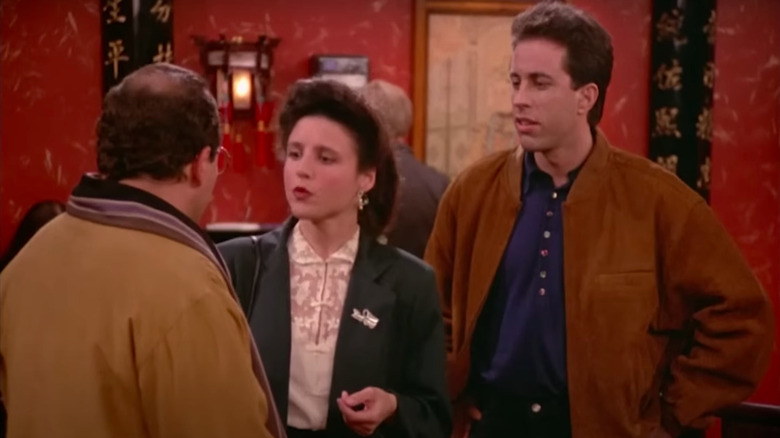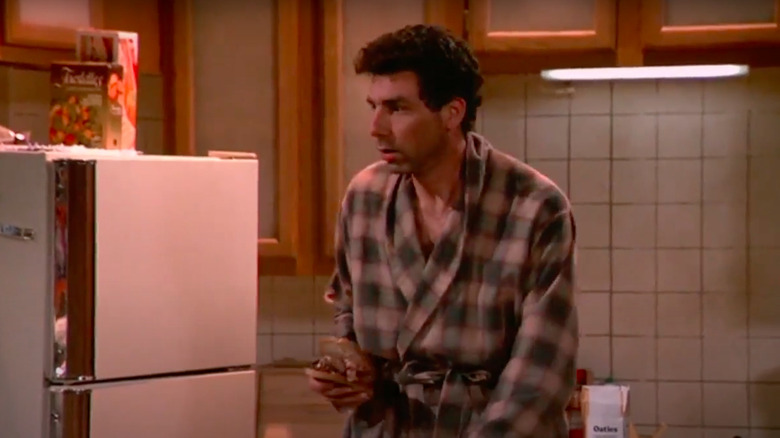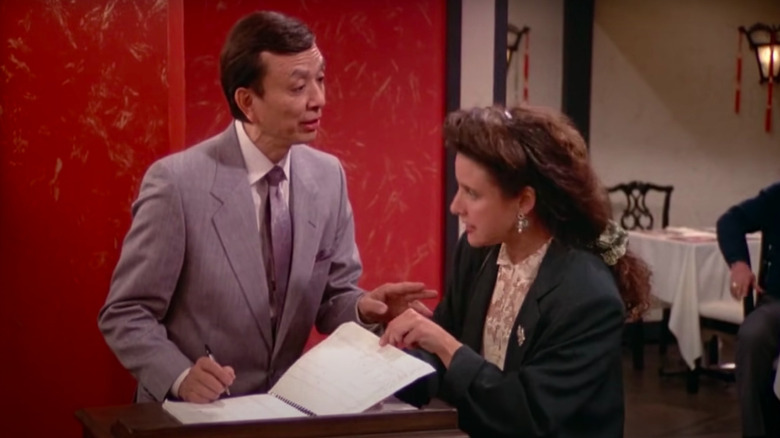The Classic Seinfeld Episode That Hurt Michael Richards' Feelings
Over the course of its run on NBC, "Seinfeld" carved out a legacy for itself as one of the most iconic sitcoms to ever grace the small screen. Focusing on the personal life of titular standup comedian Jerry Seinfeld, the show featured one of the most hilarious ensembles of main and supporting characters in the history of the medium. At the core of this ensemble (besides Jerry himself) was Jason Alexander as George Costanza, Julia Louis-Dreyfus as Elaine Benes, and Michael Richards as Cosmo Kramer.
Across their creative collaborations spanning nine seasons on NBC, the core cast of "Seinfeld" developed a notable on-screen rapport. However, it turns out that one key episode of the show actually hurt Richards' feelings when it was produced. In fact, after the conclusion of the series, Richards spoke out about the classic episode of the show and explained why it did not sit right with him at the time of production.
Michael Richards felt left out of the iconic Chinese Restaurant episode
While Kramer is a core member of the overall "Seinfeld" ensemble, there are two "Seinfeld" episodes that don't feature Kramer. The first of these is the now-iconic episode, "The Chinese Restaurant," in which Jerry, Elaine, and George find themselves waiting for a table in a busy dining establishment. The whole episode revolves around them killing time and scheming for ways to get to the table quicker before ultimately giving up and leaving at the end. Just as they leave the restaurant, the host (played by Hollywood legend James Hong) calls them for their table.
This was the first episode not to include Kramer in the story, as well as the first episode to not utilize all four of the show's core characters. As it turns out, this creative decision did not sit right with Michael Richards. In a DVD extra tied to the Season 2 episode (via YouTube), Richards said, "When I wasn't in the Chinese restaurant episode, I felt hurt. I felt that I was being written out of the show. I remember Larry [David] came to me and said, 'We're not gonna do this all the time.'" So, while the episode proved immensely popular, at the time, Richards was concerned that it was a sign that Kramer might be phased out of the show, despite David's assurances to the contrary.
The original conceit for Kramer was that he never left his apartment
The fact that Kramer didn't appear in this episode of "Seinfeld" had nothing to do with the possibility of Michael Richards getting written off the show. In fact, it was based on the specific conceit of the early seasons that he would not leave the building. This element of the character is established during Kramer's first appearance in the "Seinfeld" pilot (via YouTube), in which Jerry mentions that he has not been out of their building in ten years. Elsewhere in the special features on "The Chinese Restaurant," Larry David pointed to this as the reason why Kramer did not join the other three characters in waiting for the table. As Larry David explained in the featurette on the episode, "The reason why the character isn't in 'The Chinese Restaurant' episode is because that was part of the character. He didn't go out with them."
This concept did not last long in the show's run, however, and Kramer eventually made his way out. Moreover, David is confident that Kramer would've been included in a version of the episode if it debuted later in the series. David continued, "If that episode had been written a year or two later, he would've been there." As such, the hermit element of Kramer's personality was dropped to give the writers greater flexibility. As the series progressed, Kramer traveled throughout New York with his friends and became involved in their shenanigans.
Despite Kramer's absence, the episode is considered a Seinfeld classic
Despite Kramer's absence from "The Chinese Restaurant," the episode has grown to be widely known as a critical element of the legacy of "Seinfeld." It has become generally regarded as one of the best episodes of the show to air during its decade-long run, and as recently as 2021, Variety ranked it as the fourth-best episode of the entire series. At the time of its initial premiere, it was considered groundbreaking in the sitcom world.
One of the key reasons the episode has resonated with fans and critics for over three decades is the fact that it arguably embodies the series' "show about nothing" concept. Though thin on actual plot, the episode perfectly exemplifies how "Seinfeld" was able to shine a light on many everyday relatable occurrences that people have to deal with — while also finding the humor in the situation.



